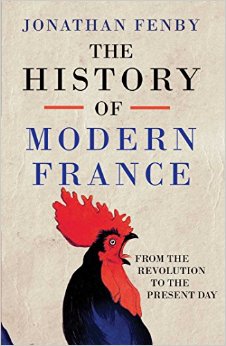People
On France, Jonathan Fenby takes the long view
Friday 24 July 2015
 Jonathan Fenby, former Reuters editor and francophile, has a new book out - his 18th.
Jonathan Fenby, former Reuters editor and francophile, has a new book out - his 18th.
The History of Modern France: From the Revolution to the Present Day, is a 536-page heavyweight covering more than two centuries of French history. It is published by Simon and Schuster.
A biographer of President Charles de Gaulle, Fenby knows France well. “I first worked in France as a junior correspondent in the Reuters Paris office in 1964-5 and was later chief correspondent and chief representative for the general news division in France,” he told The Baron.
In the early 1980s Fenby was Paris correspondent for The Economist, which now describes him as a “veteran and affectionate observer of France”.
In his latest book he takes the long view, recounting the country’s modern history, starting in 1789 and ending with the Charlie Hebdo terrorist attacks of January this year.
“The bulk of the book is a well-told narrative account, and so valuable primarily as a text of reference,” The Economist says. “But he is at his best when he teases out the tensions between the republican unifying ideal and the enduring divisions that periodically emerge to challenge the French nation.
“Mr Fenby marshals evidence to suggest that the republican tradition, celebrated in so many French national rituals, is less deeply rooted than is commonly assumed. In doing so, he leans on an idea formulated by Sudhir Hazareesingh, an Oxford scholar, that France is an ‘unfinished republic’. The secular republic, with its impulse to centralise, standardise and unify, has always collided with the fractious forces of rebellion, pitting secularists against Catholic traditionalists, Jacobins against royalists, left against right. For all its revolutionary mythology, the author writes, the nation has never ‘fully digested that heritage because it has never wanted to shed its other, more conservative character’.” ■
- « Previous
- Next »
- 319 of 579